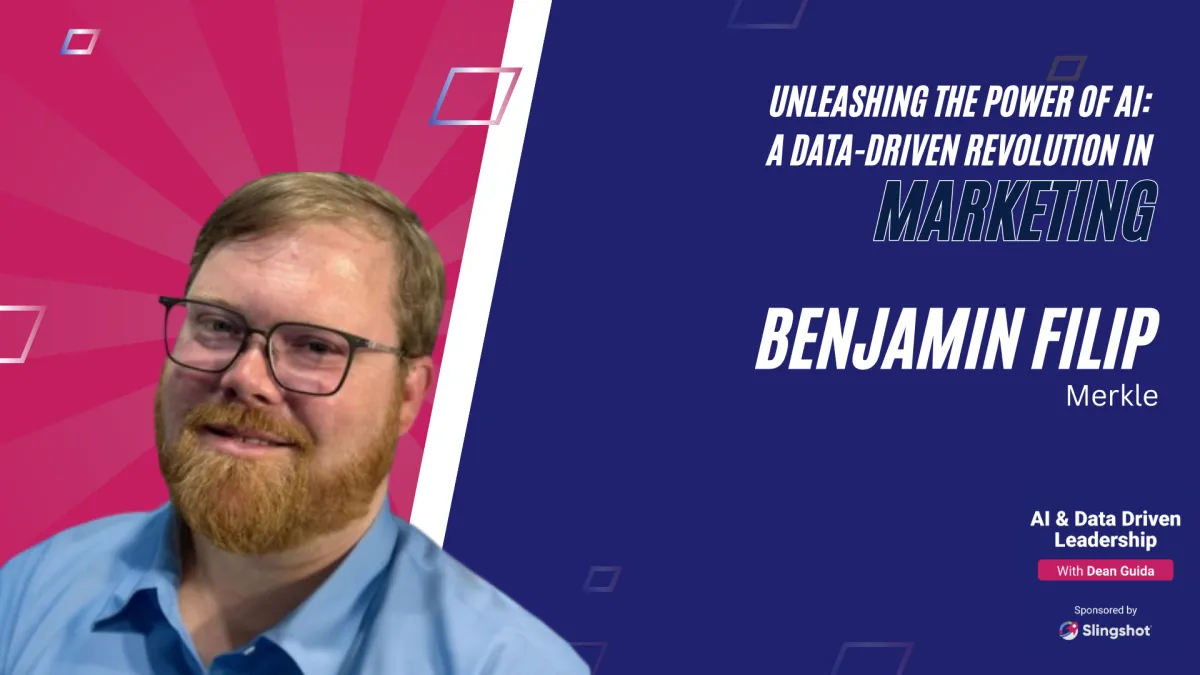Blog

35 - Unleashing the Power of AI: A Data-Driven Revolution in Marketing
Unlocking Marketing Insights with Data and AI: Benjamin Filip of Merkle
In this episode of the AI & Data Driven Leadership Podcast, host Dean Guida sits down with Benjamin Filip, Director of Analytics at Merkle, to explore the evolving landscape of marketing analytics, attribution modeling, and AI integration. With over 15 years of experience in analytics and data-driven marketing, Benjamin shares actionable insights on optimizing ROI, leveraging AI responsibly, and building analytics frameworks that empower businesses to make smarter decisions. This conversation is essential listening for marketers, analysts, and business leaders looking to harness data and AI to drive measurable growth.
Modeling, Attribution, and AI in Marketing
Benjamin emphasizes that modeling and attribution are the backbone of effective marketing strategy. Modeling involves building mathematical frameworks to understand which marketing channels and tactics deliver results, while attribution assigns credit to the right touchpoints so marketers know which actions—ads, emails, social posts—actually influence customer decisions. He also underscores that AI can automate repetitive tasks and generate frameworks, but human expertise remains essential for nuanced insights.
For organizations looking to optimize campaigns, Benjamin recommends reviewing attribution models regularly and using granular data by region or customer segment to uncover hidden opportunities. This combination of data-driven modeling and AI assistance ensures marketing spend is directed efficiently and campaigns are more personalized and relevant.
AI adoption should be strategic: start with well-defined, repetitive tasks where AI can add immediate value. Whether automating data hygiene, drafting analysis briefs, or supporting internal knowledge systems, AI should act as an assistant that enhances human decision-making rather than replacing it.
Finally, companies must integrate AI incrementally. By piloting one or two high-impact use cases, measuring results, and scaling thoughtfully, organizations avoid wasted investment and maximize the benefits of AI in analytics.
About Benjamin Filip
Benjamin Filip is Director of Analytics at Merkle, specializing in marketing analytics, attribution modeling, and AI-driven insights. He has spent over 15 years helping organizations optimize marketing spend, improve customer engagement, and implement analytics frameworks that drive measurable growth.
About Merkle
Merkle is a leading data-driven marketing agency that helps businesses leverage analytics, AI, and customer insights to drive ROI. Their services span marketing strategy, technology integration, and customer experience, empowering clients to achieve measurable growth in complex digital landscapes.
Links Mentioned in this Episode
Key Episode Highlights
The difference between modeling and attribution and why both are essential.
AI is a tool for efficiency, not a replacement for human expertise.
Practical AI applications: data hygiene, analysis briefs, and internal knowledge bots.
How to integrate AI incrementally and strategically to avoid wasted investment.
Continuous learning, upskilling, and cross-functional collaboration are critical for future-ready analytics teams.
Conclusion
Benjamin Filip’s insights reveal that combining human expertise with AI and analytics is key to modern marketing success. By refining attribution, strategically leveraging AI, and adopting a continuous learning mindset, businesses can optimize ROI, deliver relevant customer experiences, and stay ahead in an increasingly data-driven world.
Explore Slingshotapp.io to learn more about AI-driven leadership solutions, and if you’re a qualified leader interested in sharing your insights, apply to be a guest on the AI & Data Driven Leadership Podcast here.
Listen and Subscribe to the AI & Data Driven Leadership Podcast Now:
Say "Hey, Siri / Alexa. Play AI & Data Driven Leadership Podcast"
About The Host
Tech entrepreneur and CEO Dean Guida knows there’s a limit to what you can build with grit alone.
At sixteen, Dean bought the first IBM PC and fell in love with writing software. He went on to receive a Bachelor of Science degree in operation research from the University of Miami. After graduating, he was a freelance developer and wrote many systems for IBM and on Wall Street. At twenty-three, he started Infragistics to build UX/UI tools for professional software developers.
Seemingly overnight, Dean had to go from early internet coder to business operator—a feat that forced him to learn some of business’s biggest lessons on the job. He immediately began navigating the nuances of scaling a company, hiring and growing teams, and becoming a leader, a manager, and a mentor.
Fast-forward thirty-five years, and Dean’s tech company now has operations in six countries. More than two million developers use Infragistics software, and its client roster boasts 100 percent of the S&P 500, including Fidelity, Morgan Stanley, Exxon, Intuit, and Bank of America.

Media














